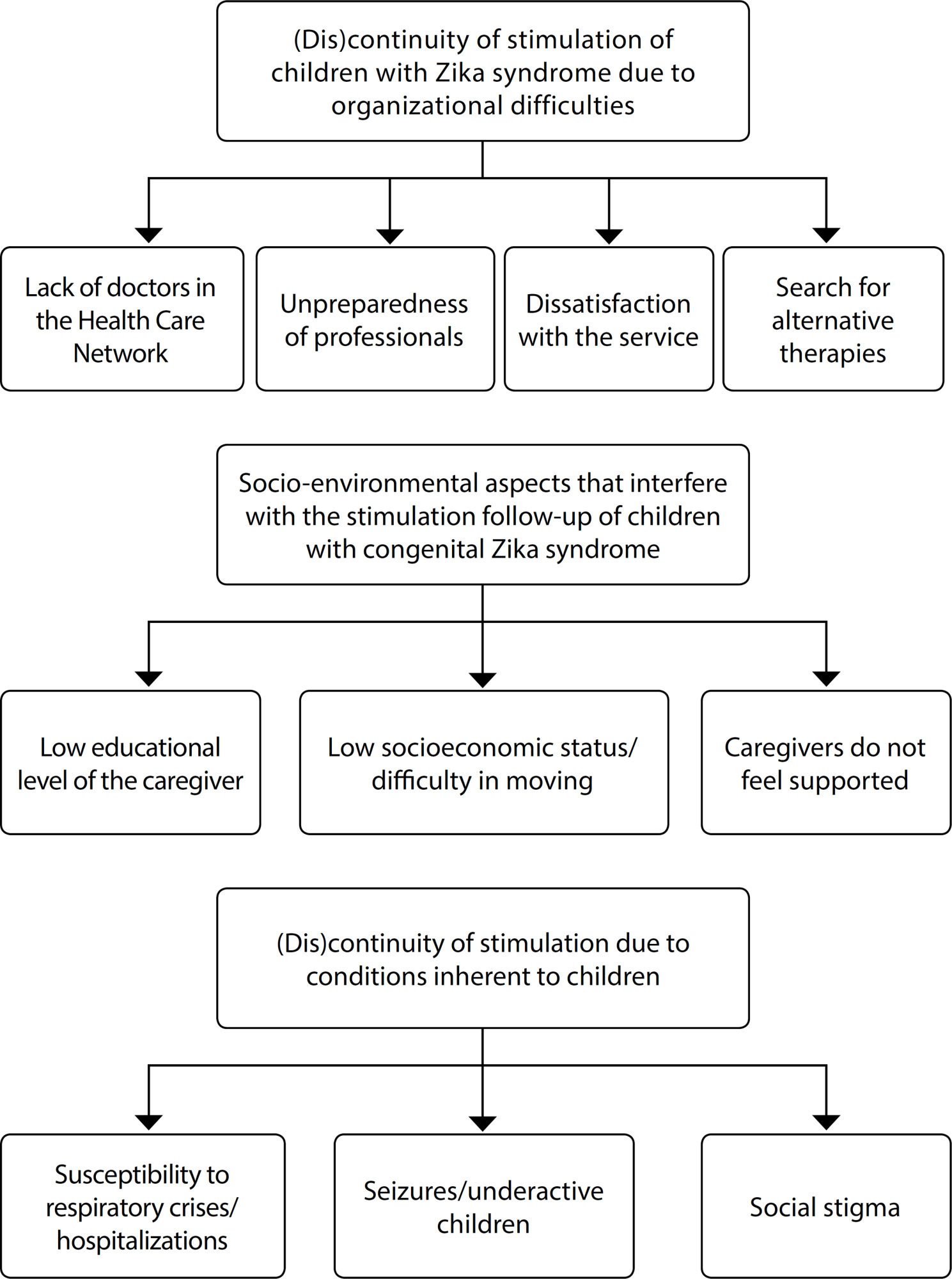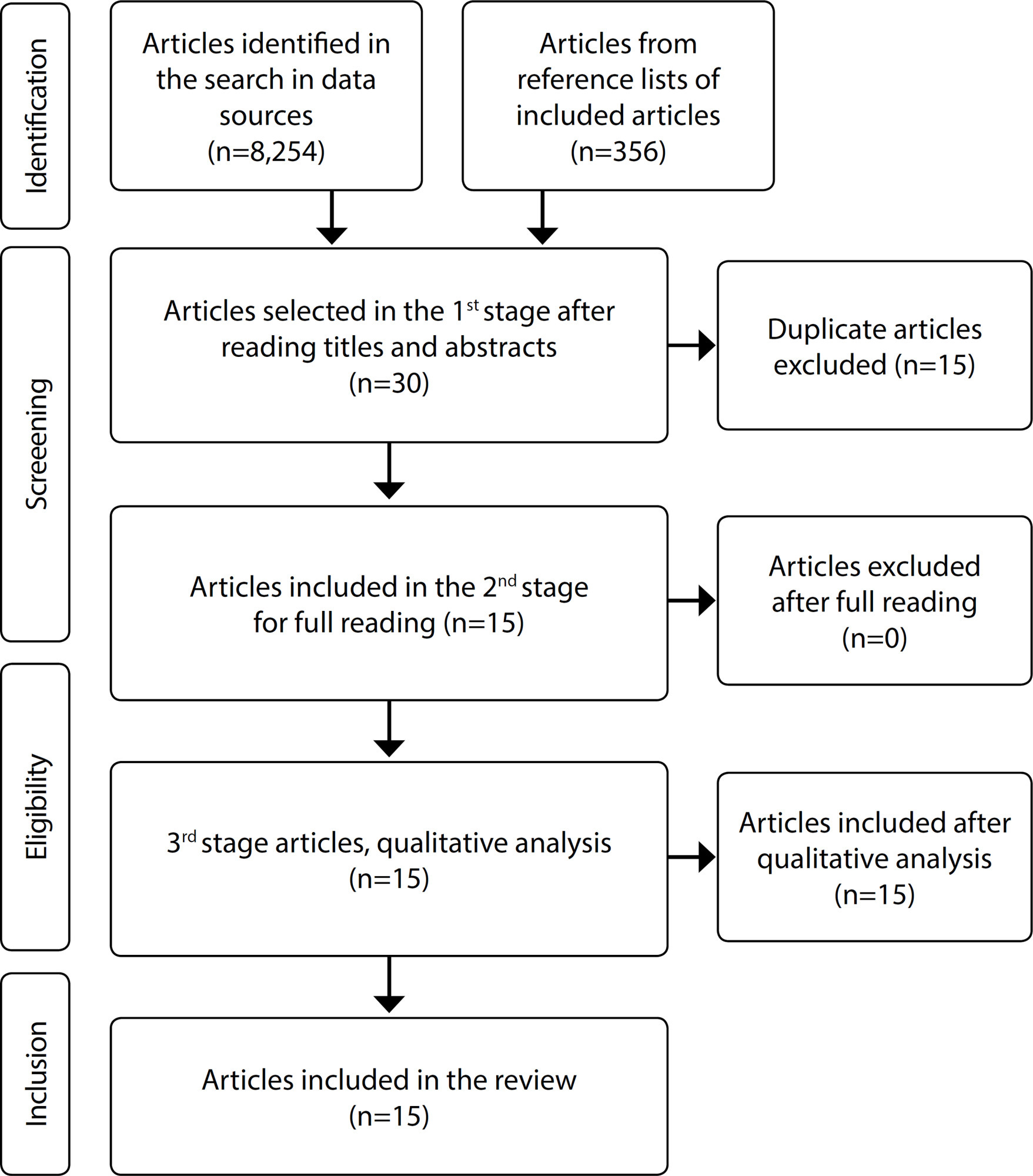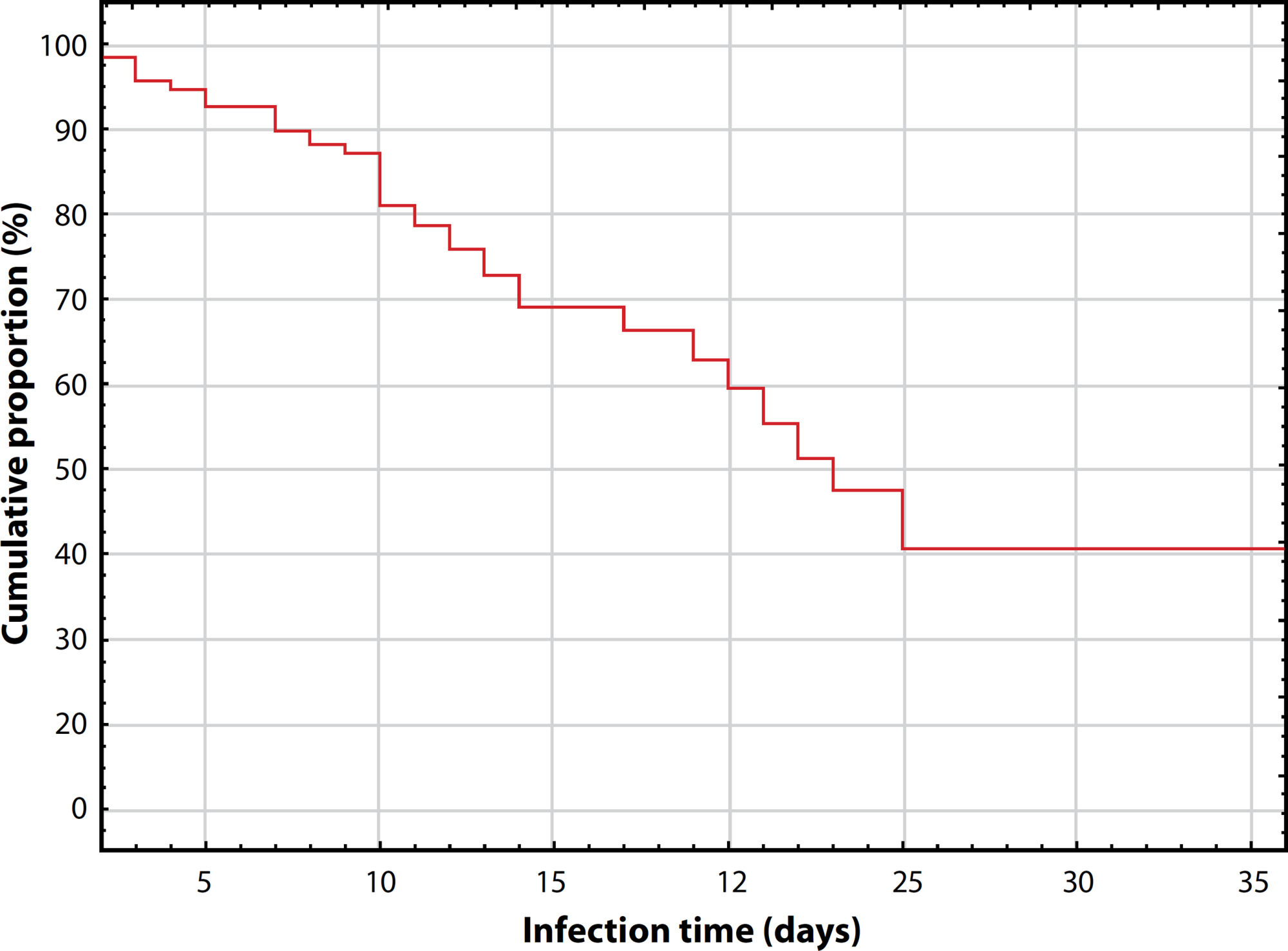-
RESEARCH01-01-2018
Introduction of the School Health Program in the city of Cascavel, Paraná State: report of nurses
Revista Brasileira de Enfermagem. 2018;71:1540-1547
Abstract
RESEARCHIntroduction of the School Health Program in the city of Cascavel, Paraná State: report of nurses
Revista Brasileira de Enfermagem. 2018;71:1540-1547
DOI 10.1590/0034-7167-2017-0188
Views1See moreABSTRACT
Objective:
to understand the introduction of the School Health Program in the city of Cascavel, Paraná State, as opposed to the report of nurses.
Method:
a qualitative study with fifteen participants. The data were collected from April to August 2015, through semi-structured interviews, analyzed by content analysis and thematic modality.
Results:
the category “Introduction process” of the School Health Program integrates the subcategories “Identified health problems” and the “Challenges of intersectoriality”. The program was implemented quickly, with a fragile training of professionals to perform in the phases that compose it. Structural conditions of schools, human and material resources, and emerging intersectoral interaction were identified obstacles. The integration of the health, school, and family constitutes the program’s potentiality.
Final considerations:
it is understood that the actions of the program were based on health assessments of students, and it is necessary for professionals and managers to discuss and analyze the obstacles identified to achieve all the proposed objectives.
-
RESEARCH01-01-2018
Teaching-learning tendencies and strategies used in the leadership development of nurses
Revista Brasileira de Enfermagem. 2018;71:1531-1539
Abstract
RESEARCHTeaching-learning tendencies and strategies used in the leadership development of nurses
Revista Brasileira de Enfermagem. 2018;71:1531-1539
DOI 10.1590/0034-7167-2017-0455
Views0See moreABSTRACT
Objective:
To identify the tendencies and teaching-learning strategies used for leadership development in the discipline Nursing Administration in higher education institutions in Brazil.
Method:
Non-experimental, type survey, descriptive and exploratory, cross-sectional, with quantitative approach.
Results:
The dialogued lecture strategy was cited as used by 241 (91%) professors, followed by research, by 237 (89%), and discussion or group work, by 221 (83%). Strategies not used were: spiral learning, 166 (63%), and online programs, 151 (57%) professors. The strategy that presents higher tendency of use is that of online courses, 104 (39%).
Conclusion:
among the strategies mentioned, all are aligned with the directions given in the literature for nursing education, but these strategies and methodologies influence the formation of leader nurses differently.
-
RESEARCH01-01-2018
Plataforma PEnsinar®: a learning tool for teaching the nursing process
Revista Brasileira de Enfermagem. 2018;71:1522-1530
Abstract
RESEARCHPlataforma PEnsinar®: a learning tool for teaching the nursing process
Revista Brasileira de Enfermagem. 2018;71:1522-1530
DOI 10.1590/0034-7167-2016-0411
Views0See moreABSTRACT
Objective:
to describe the construction and transition phases undertaken in the development of a virtual learning environment named Plataforma PEnsinar® (PEnsinar Platform®). This platform aims at teaching the nursing process and the nursing classifications NANDA International, NIC, NOC and ICNP®.
Method:
this is a methodological and technological development research that used construction and transition phases of the software development process named Rational Unified Process.
Results:
the software was developed in the construction phase. Unit and integration tests of components of interfaces were held. In the transition phase, the complete system was showed to the users. It was completely working considering the applicability and employment, under conditions to be implemented and evaluated.
Conclusion:
the study showed how the construction and transition phases of the Plataforma PEnsinar® were developed. It was based on a proposal that inserts the student as an active agent in the nursing process and the professor as a mediator, providing tools that will contribute to a better learning.

-
RESEARCH01-01-2018
Clinical and management skills for hospital nurses: perspective of nursing university students
Revista Brasileira de Enfermagem. 2018;71:1514-1521
Abstract
RESEARCHClinical and management skills for hospital nurses: perspective of nursing university students
Revista Brasileira de Enfermagem. 2018;71:1514-1521
DOI 10.1590/0034-7167-2017-0452
Views0See moreABSTRACT
Objective:
to analyze nursing university students’ perception of the professional skills to act in the hospital setting developed during their academic training, and what strategies are being created for the development of these skills during their performance.
Method:
an exploratory, qualitative study in which 40 nursing university students participated. The data were collected from September to December 2016 and conducted thematic inductive analysis.
Results:
clinical skills were identified that could be learned and previously developed at the undergraduate level; and management skills learned during undergraduate education and developed only in the hospital environment. Strategies for the development of skills were identified, such as individual study and Permanent Education, by the employing institution.
Final considerations:
it was evidenced that college contributed in significant proportions for learning and development of some clinical and management skills in the hospital. Still, despite the identified strategies, managers and training centers need to continuously implement strategies for the development of new skills in nurses.
-
RESEARCH01-01-2018
Nursing educational intervention for the identification of Adverse Events in hemodialysis
Revista Brasileira de Enfermagem. 2018;71:1507-1513
Abstract
RESEARCHNursing educational intervention for the identification of Adverse Events in hemodialysis
Revista Brasileira de Enfermagem. 2018;71:1507-1513
DOI 10.1590/0034-7167-2017-0843
Views0See moreABSTRACT
Objective:
To develop an educational program aimed at the qualification of the nursing technicians that makes possible the understanding of Adverse Events (AE), aiming to adapt the data records; to elaborate tools for the records of the AE in hemodialysis patients; and to assess the knowledge before and after the educational program.
Method:
An educational intervention was conducted through a classroom and online course on how to recognize and record AE in hemodialysis. The effectiveness of the program was assessed through the gain of knowledge measured through online record of the AE in fictitious problem cases before and after the course.
Result:
Sixteen nursing technicians participated in the study. In the initial test, the mean score was 3.7 ± 0.3 points and in the final assessment was 4.2 ± 0.3 points (p=0.0002).
Conclusion:
It was possible to verify that the educational intervention contributed to increase the knowledge of the participants and that the training of these can be achieved with classroom and online learning courses.
-
RESEARCH01-01-2018
Nursing laboratory and critical education of nurses: approaches and distances
Revista Brasileira de Enfermagem. 2018;71:1500-1506
Abstract
RESEARCHNursing laboratory and critical education of nurses: approaches and distances
Revista Brasileira de Enfermagem. 2018;71:1500-1506
DOI 10.1590/0034-7167-2017-0339
Views1See moreABSTRACT
Objective:
to analyze the contribution of the laboratory of nursing to the critical education of nurses.
Method:
qualitative study, conducted among 18 professors of higher education institutions, being one public and the other private. Data were collected between February and November of 2016 by means of semi-structured interview. To analyze data, it was used a content analysis in the thematic modality.
Results:
it was observed the emphasis in the technical skills development by propagation of behavior and practices; the creation of bonds between professors and students happens on the limit of good interpersonal relationship; the laboratory of nursing may help the critical reflection about the practice, being a place that allows the learning of ethics.
Final considerations:
the nurse education, carried out by the laboratory of nursing, have to overcome the emphasis in the uncritical reproduction of practices and to observe the nurse’s power to think about the reality in the meaning of its modification.
-
RESEARCH01-01-2018
Students’ knowledge of metabolic syndrome after educational intervention
Revista Brasileira de Enfermagem. 2018;71:1493-1499
Abstract
RESEARCHStudents’ knowledge of metabolic syndrome after educational intervention
Revista Brasileira de Enfermagem. 2018;71:1493-1499
DOI 10.1590/0034-7167-2017-0342
Views1See moreABSTRACT
Objective:
To analyze the knowledge of children and adolescents about risk factors for metabolic syndrome (MS) before and after educational interventions.
Method:
A quasi-experimental, comparative, prospective and intervention study conducted in 2015 and 2016 with 43 students in the city of Picos (state of Piauí-PI). Five health education meetings were held. For the knowledge analysis, was applied a questionnaire at three different moments.
Results:
Participants’ mean age was 12.6 years (± 2.1), of which 60.5% were female. The ‘More than good’ level of knowledge went from 20.9% to 55.8% after interventions. When evaluated late, students maintained a higher level of knowledge compared to before the interventions. Most said they were able to change their lifestyle after educational meetings.
Conclusion:
The educational intervention promoted increase of knowledge and stimulated changes in attitudes related to risk factors associated with MS.
-
RESEARCH01-01-2018
Work engagement among participants of residency and professional development programs in nursing
Revista Brasileira de Enfermagem. 2018;71:1487-1492
Abstract
RESEARCHWork engagement among participants of residency and professional development programs in nursing
Revista Brasileira de Enfermagem. 2018;71:1487-1492
DOI 10.1590/0034-7167-2017-0278
Views0See moreABSTRACT
Objective:
to assess the levels of engagement at work of nurses enrolled in multi-professional residency and professional development programs in health care of a Brazilian public institution.
Method:
a cross-sectional study with 36 professionals. The data were collected in September 2013, with use of the Utrecht Work Engagement Scale (UWES), composed of seventeen self-evaluation items with the dimensions vigor, dedication and absorption, as well as an overall score.
Results:
the levels of engagement ranged from 3.8 to 4.3, and the standard deviations, between 1.1 and 1.3. Nurses showed average levels on vigor (3.8) and absorption (3.9) dimensions, and high levels on dedication (4,3) and engagement (4.0).
Conclusion:
the professionals presented good levels of energy, resilience, enthusiasm and involvement with the work. They are satisfied with the activity and are dedicated to it, which promotes the acquisition of skills and competences along the in-service training, ensuring a future professional practice of quality.
-
ORIGINAL ARTICLE06-14-2021
Continuity of neuro-psychomotor stimulation of children with congenital Zika syndrome
Revista Brasileira de Enfermagem. 2021;74(6):e20200694
Abstract
ORIGINAL ARTICLEContinuity of neuro-psychomotor stimulation of children with congenital Zika syndrome
Revista Brasileira de Enfermagem. 2021;74(6):e20200694
DOI 10.1590/0034-7167-2020-0694
Views0See moreABSTRACT
Objective:
Understand the continuity of stimulation of neuro-psychomotor development in children with congenital Zika syndrome.
Method:
Descriptive-exploratory study with theoretical support in symbolic interactionism. Between August and November 2019, 12 health professionals were interviewed in depth; and to the focus group, seven caregivers of children with the syndrome. The analysis was thematic inductive.
Results:
The continuation of neuro-psychomotor stimulation of children with Zika syndrome goes through: organizational difficulties (lack of doctors, professional unpreparedness, dissatisfaction and search for other services); socioenvironmental aspects (low maternal education, low socioeconomic level, difficulty in moving and lack of support); and conditions inherent to children (hospitalizations for respiratory crises, seizures, hypoactivity and social stigma).
Final considerations:
A strengthened support network with qualified human resources is necessary in order to provide comprehensive care and avoid the discontinuity of neuro-psychomotor stimulation of children with congenital Zika syndrome.

-
ORIGINAL ARTICLE08-20-2021
Risk of suicide among nursing students
Revista Brasileira de Enfermagem. 2021;74(6):e20200867
Abstract
ORIGINAL ARTICLERisk of suicide among nursing students
Revista Brasileira de Enfermagem. 2021;74(6):e20200867
DOI 10.1590/0034-7167-2020-0867
Views0See moreABSTRACT
Objectives:
to identify the risk and degree of risk of suicide in nursing students of a public institution in the countryside of Pernambuco, Brazil.
Methods:
this was a cross-sectional, quantitative research conducted with 150 students. For data collection, a sociodemographic questionnaire and the instrument, M.I.N.I. – Brazilian version 5.0.0 – Module C – Risk of suicide were used. Statistical analyses were performed with IBM(® )SPSS(®), version 23.
Results:
53.3% of nursing students had a risk of suicide, of which 20.7% had a high risk. Moreover, 22.67% reported previous suicide attempt. It is noteworthy that students without a partner have a higher risk of suicide (56.8%) than those with a partner (29.4%).
Conclusions:
it is perceived the need to develop programs that identify students at risk of suicide in higher education institutions, in order to raise awareness of the problem and implement policies to promote mental health in the academia.
-
REVIEW08-20-2021
Root Cause Analysis, Failures and Effects in pediatric total quality management: a scoping review
Revista Brasileira de Enfermagem. 2021;74(6):e20200954
Abstract
REVIEWRoot Cause Analysis, Failures and Effects in pediatric total quality management: a scoping review
Revista Brasileira de Enfermagem. 2021;74(6):e20200954
DOI 10.1590/0034-7167-2020-0954
Views0See moreABSTRACT
Objectives:
to analyze the applicability of Root Cause Analysis and Failure Mode and Effect Analysis tools, aiming to improve care in pediatric units.
Methods:
this is a scoping review carried out according to the Joanna Briggs Institute guidelines, following the Preferred Reporting Items for Systematic Reviews and Meta-Analyzes extension for Scoping Reviews. Search took place in May 2018 on 15 data sources.
Results:
search totaled 8,254 studies. After using the relevant inclusion and exclusion criteria, 15 articles were included in the review. Of these, nine were published between 2013 and 2018, 12 used Failure Mode and Effect Analysis and 11 carried out interventions to improve the quality of the processes addressed, showing good post-intervention results.
Final Considerations:
the application of the tools indicated significant changes and improvements in the services that implemented them, proving to be satisfactory for detecting opportunities for improvement, employing specific methodologies for harm reduction in pediatrics.

-
ORIGINAL ARTICLE07-26-2021
Representations about sexuality of people diagnosed late with HIV infection
Revista Brasileira de Enfermagem. 2021;74(6):e20201028
Abstract
ORIGINAL ARTICLERepresentations about sexuality of people diagnosed late with HIV infection
Revista Brasileira de Enfermagem. 2021;74(6):e20201028
DOI 10.1590/0034-7167-2020-1028
Views0See moreABSTRACT
Objective:
to understand the representations about sexuality of people diagnosed late with HIV infection and its implications in the delayed search for diagnosis.
Methods:
this is a qualitative study, whose theoretical and methodological framework was Social Representation Theory. The research was carried out with 18 people diagnosed late with HIV infection through an open interview. For data analysis, Structural Narration Analysis was used, with support from MAXQDA 12®.
Results:
representations about sexuality contributed to delayed diagnosis, such as trust in a fixed partnership, sexual intercourse is natural, sexuality as a taboo, search for pleasure in sexual intercourse, regardless of risks, denial of risk for HIV infection.
Final considerations:
representations about sexuality participate in a web of stereotypes and riskier ways of living, which contribute to delayed diagnosis. Sexual health education remains necessary and essential throughout people’s lives.
-
08-20-2021
Prevalence of central venous catheter salvage in newborn with staphylococcal bloodstream infection
Revista Brasileira de Enfermagem. 2021;74(6):e20201073
Abstract
Prevalence of central venous catheter salvage in newborn with staphylococcal bloodstream infection
Revista Brasileira de Enfermagem. 2021;74(6):e20201073
DOI 10.1590/0034-7167-2020-1073
Views0See moreABSTRACT
Objectives:
to establish the prevalence of salvage of central venous catheters in newborns with bloodstream infection caused by coagulase-negative staphylococci.
Methods:
retrospective cross-sectional study with 136 newborns admitted to the Neonatal Intensive Care Unit between 2011 and 2017. The total of 143 infection events undergoing antibiotic therapy were evaluated.
Results:
among the 143 infection events, 39 catheters in which antibiotic therapy was used were saved and in 69 cases, the device was removed. Positive central blood culture and single lumen catheter were factors associated with salvage failure. The probability of salvage decreased with infections diagnosed from 15 days of using the catheter. Negative blood culture raised the chance of salvage by fourfold.
Conclusions:
the use of antibiotic therapy in the treatment of infections resulted in a low prevalence of salvage of the central venous catheter. The probability of salvage was associated with variables of the device.

-
EXPERIENCE REPORT02-15-2021
Coronavirus infections: health care planning based on Orem’s Nursing Theory
Revista Brasileira de Enfermagem. 2021;74:e20200281
Abstract
EXPERIENCE REPORTCoronavirus infections: health care planning based on Orem’s Nursing Theory
Revista Brasileira de Enfermagem. 2021;74:e20200281
DOI 10.1590/0034-7167-2020-0281
Views0See moreABSTRACT
Objective:
to report the experience of professors and students of a graduate course on nursing care in coping with the new coronavirus (COVID-19) based on Self-Care Theory.
Method:
the active methodologies used were a literature search and seminar presentations, with an understanding of Orem’s theoretical concepts: health; man; self-care; universal, developmental and health deviation requirements; self-care activities; self-care deficits; the required therapeutic demand; nursing systems. The pandemic was considered a health deviation that requires critical thinking and nursing care planning. Methodological frameworks to classify nursing diagnoses, interventions, and outcomes were used.
Results:
for each health deviation, nursing systems were identified; self-care deficits, diagnoses; actions, interventions; and the form of assessment, outcomes.
Final considerations:
theoretical-practical reflections of the academic context support nursing care planning.
-
REFLECTION03-05-2021
Reflections on patient safety incident reporting systems
Revista Brasileira de Enfermagem. 2021;74:e20200307
Abstract
REFLECTIONReflections on patient safety incident reporting systems
Revista Brasileira de Enfermagem. 2021;74:e20200307
DOI 10.1590/0034-7167-2020-0307
Views0See moreABSTRACT
Objective:
To reflect on the main characteristics and recommendations of Incident Reporting Systems, discuss the population’s participation in reporting, and point out challenges in the Brazilian system.
Method:
Reflection study, based on Ordinance No. 529/13, which instituted the National Patient Safety Program, under Collegiate Board Resolution (CBR) No. 36/13; reflections by experts were added.
Results:
Reporting systems are a source for learning and monitoring, allow early detection of incidents, investigations and, mainly, the generation of recommendations prior to recurrences, in addition to raising information for patients and relatives. There is little participation of the population in the reporting, regardless of the type of system and characteristics such as confidentiality, anonymity, and mandatory nature.
Final Considerations:
In Brazil, although reporting is mandatory, there is an urgency to advance the involvement and participation of the population, professionals, and institutions. To simplify data entry by improving the interface and importing data from the reporting system is an objective to be achieved.
-
EXPERIENCE REPORT01-29-2021
Restructuring service at a mastology outpatient clinic during the COVID-19 pandemic
Revista Brasileira de Enfermagem. 2021;74:e20200571
Abstract
EXPERIENCE REPORTRestructuring service at a mastology outpatient clinic during the COVID-19 pandemic
Revista Brasileira de Enfermagem. 2021;74:e20200571
DOI 10.1590/0034-7167-2020-0571
Views0INTRODUCTIONCOVID-19 is a disease caused by the SARS-CoV-2 coronavirus (Severe Acute Respiratory Syndrome Coronavirus 2) and has brought a threat to public health worldwide. In need of immediate changes, adaptations tend to be the way out to avoid contamination that potentially does not distinguish race, color, gender().The global numbers of suspected and confirmed cases are […]See more
Search
Search in:
Nuvem de Tags
Adolescente (85) Atenção Primária à Saúde (239) COVID-19 (91) Criança (91) Cuidados de Enfermagem (269) Educação em Enfermagem (151) Educação em Saúde (139) Enfermagem (930) Enfermagem Pediátrica (86) Estudantes de Enfermagem (77) Estudos de Validação (131) Família (87) Idoso (208) Promoção da Saúde (99) Qualidade de Vida (104) Saúde do Trabalhador (86) Saúde Mental (145) Saúde Pública (82) Segurança do Paciente (150) Tecnologia Educacional (100)



